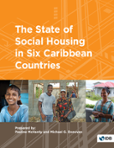The State of Social Housing in Six Caribbean Countries
Date
Apr 2016
Despite the large number of social housing programs in the Caribbean, little is known about their outcomes and the factors underlying evolution of housing policy. This report reviews the implementation of social housing programs from 2000 to 2015 in the six Caribbean member states of the Inter-American Development Bank: The Bahamas, Barbados, Guyana, Jamaica, Suriname, and Trinidad and Tobago. The period studied encompasses the emergence of neighborhood upgrading programs, increasing urbanization, and the integration of environmental sustainability into housing programs, especially those in vulnerable coastal areas. The research employs two major research strategies: a comparative quantitative analysis of housing data (housing demand, deficits, and both formal and informal housing production) and six national case studies on social housing policy evolution. The report underscores the importance of housing to achieve the Sustainable Development Goals and the larger agenda in poverty alleviation, economic development, and climate resilience.



